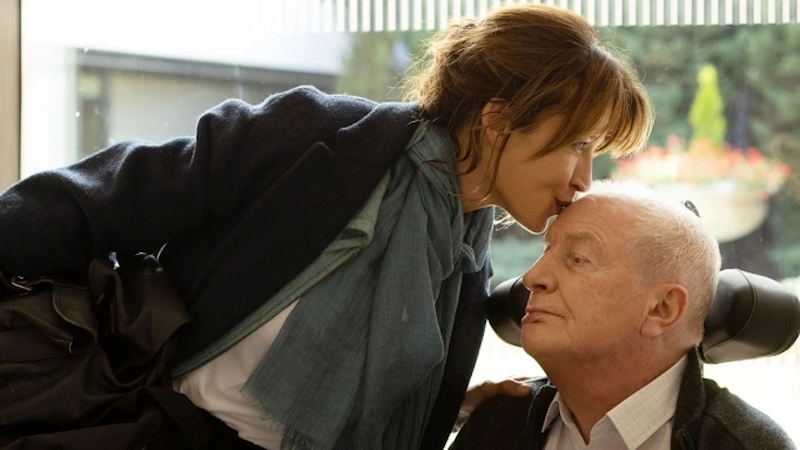Director – François Ozon – 2021 – France – Cert. 15 – 113m
*****
An elderly man recovering from a stroke enlists his two daughters to help him achieve assisted suicide and die with dignity – out in cinemas on Friday, June 17th
Emmanuèle Bernheim (Sophie Marceau) gets a phone call to say that her dad André Bernheim (André Dussollier), 85, is in hospital recovering from a stroke. She rushes to the hospital to meet her sister Pascale Bernheim (Géraldine Pailhas) in ER where he’s having an MRI scan. When they see him on the ward, mouth elongated on on side of his face, he can’t remember what happened. He has lost many everyday functions of his body.
While a fellow stroke survivor on his hospital ward makes rapid enough progress to soon be discharged, the less fortunate and initially bedridden André is moved to another hospital for more specialist treatment. Nevertheless, he eventually improves and in due course graduates to being sat in a chair in his room. Later still, he learns to use a wheelchair. His dietary abilities improve from initial intravenous drip feed through being spoon-fed mashed veg through to eating accompanied in a restaurant.
On one occasion early on when Emmanuèle visits him in hospital, she’s horrified to discover him lying in bed in his own excrement and immediately summons the manageress, who not only makes excuses about the amount of work required to look after a patient like this and how the hospital is short-staffed but also gives a personal assurance that this won’t happen again (and, indeed, no such further incident recurs).
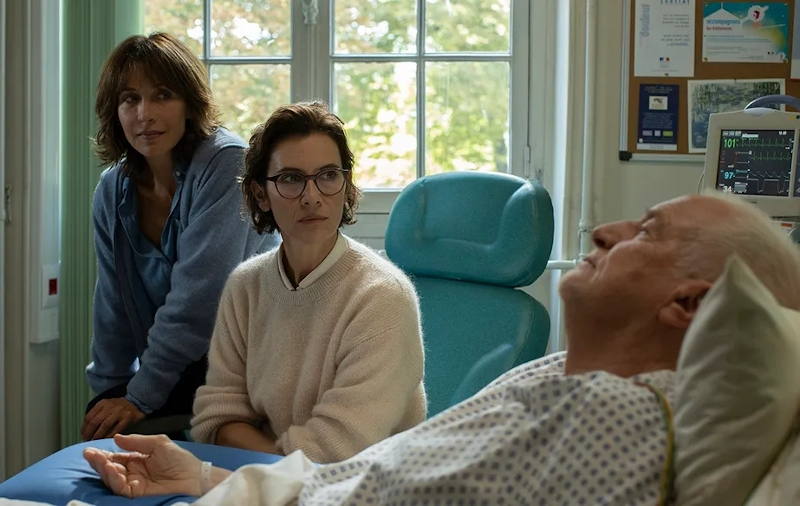
Lots of films about people in hospital as a result of debilitating health experiences go into in great detail about their health in terms of exactly what’s no longer working and how the patient works their way back to full or partial health via physiotherapy and / or other medical or psychological methods. We all want to be healthy, and perhaps the movies take advantage of this fact to sell us what we want (and make money). Bucking that questionable trend, this film doesn’t go there except in briefest, broadest outline to show that the patient is slowly recovering his health, although quite how far he’ll progress towards his pre-stroke independent living status is far from clear. However, the main interest lies elsewhere.
Fairly early on, André shocks both daughters on separate occasions by telling them, “I want to die”. Which means that, rather than endure his current health condition, or work to make it better (but probably never as good as it was), he’d rather have done with it and kill himself. A visit by Emmanuèle to her mother, André’s estranged wife the sculptress Claude de Soria (Charlotte Rampling), reveals a handgun in his desk drawer at home. In later conversation, he laments the fact he didn’t previously use it on himself before all this happened.
So while André struggles to recover his health in the hospital, Emmanuèle sets about sorting out her dad’s assisted suicide. She discovers this is illegal in France and that the only way forward is to take her father to Switzerland where it is legal and find a clinic that offers this service. Specific dates emerge as significant milestones in this journey over a period of months including the date of a first meeting with a Swiss woman (German icon Hanna Schygulla from Lili Marleen, 1981; TV Mini-series Berlin Alexanderplatz, 1980; The Marriage Of Maria Braun, 1979, all Rainer Werner Fassbuinder) who runs such a clinic in Berne and, after some discussion, the date of the assisted suicide itself.
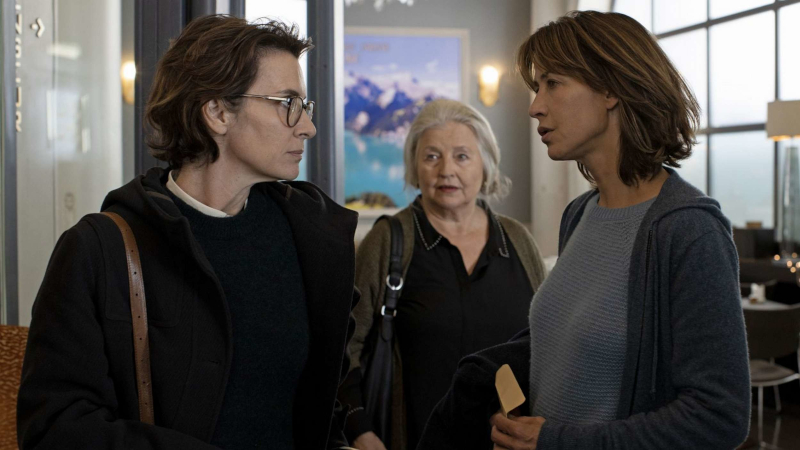
Throughout the process, the Swiss woman tells Emmanuèle that as people recover, many of them decide not to go through with killing themselves. But some still do. Both Emmanuèle and Pascale watch as André slowly recovers his health and hope that he will be one of those who will change his mind, even if only at the last minute. Their father is however a man whose lived life to the full the way he’s wanted to live it, others be damned, and he’s both stubborn and determined to see it through.
André’s has been a messy life and Emmanuèle describes him as a bad father. And among his personal detritus, spotted by the sisters hanging around the hospital who suspect intent to visit their father when neither of the sisters are on the premises, is his former friend and associate Gérard Boisrond (Grégory Gadebois), the real reason their father kept that gun in the desk drawer. This is a relationship that threatens to produce ugly scenes and on occasion does so, yet it has not been all bad in the past and gives rise to some deeply moving moments in the drama.
With their mother too getting on in years, the daughters get both parents to sign Power Of Attorney documents. Emmanuèle receives legal advice as to how to proceed with facilitating her dad’s assisted suicide without either of the sisters being prosecuted under French law. Following her lawyer’s lead, and with her father being physically incapable of writing more than the odd word, she films him on her smartphone making an oral statement about how and why he wants to kill himself. This is a deeply moving scene.
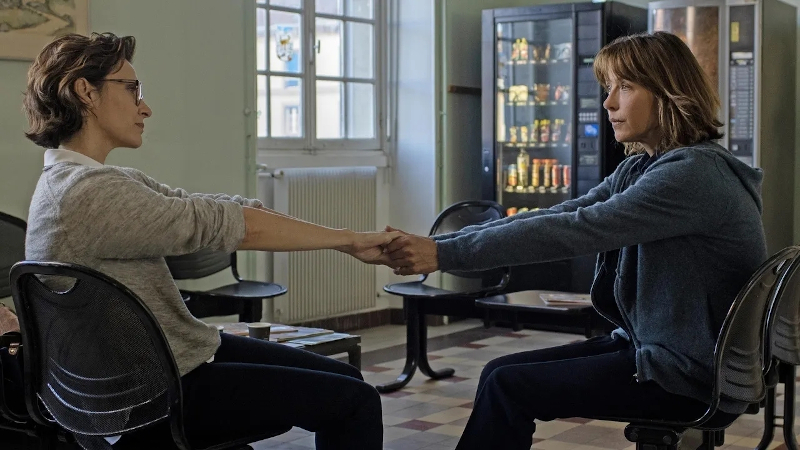
As events progress, and with André informing relatives and close friends – not all of whom are entirely sympathetic – of his intentions, someone informs on him to the police. The family haven’t informed the hospital of their intentions. At 9pm on the night the sisters are to accompany their father in the ambulance to Berne, they are required to attend a police interview with Capitaine Petersen (Nathalie Richard from After Love, Aleem Khan, 2020; Hidden, Michael Haneke, 2005).
Subterfuge is required: Emmanuèle’s film festival director life partner Serge Toubiana (Éric Caravaca from By The Grace Of God, François Ozon, 2018), who’s supposed to be attending a Buñuel retrospective, is roped in to transport André from the hospital to the couple’s apartment from where he can be put onto the ambulance. Even then, further obstacles await in the form of one of the drivers, a Muslim, who claims assisted suicide is against his faith.
At the end of all this, if André can actually get to the clinic, the question remains: will he actually go through with it? To do so, he needs to himself drink two glasses containing different liquids (because then he will be knowingly killing himself rather than being killed by someone else at their will rather than his). One of his goals in rehab is to get to the point where he’s capable of doing this by himself. And one of his fears is that, if he isn’t, or if he’s of unsound mind and unable to take the decision on the day, then he won’t be able to go through with the act. And will then be stuck, still alive, in a quality of life so low that he no longer considers it worth living.
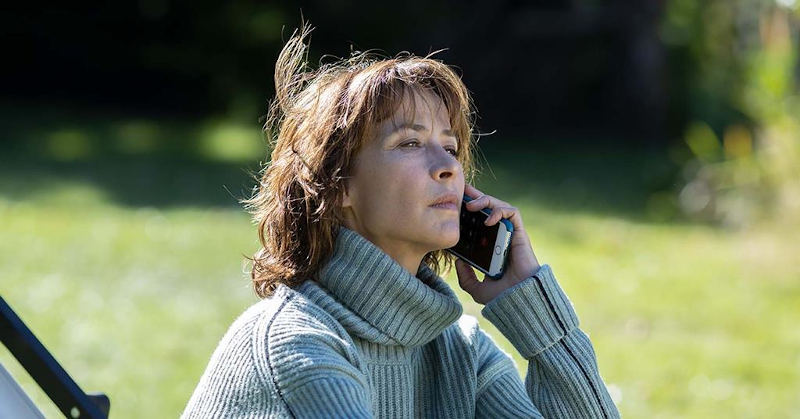
It isn’t immediately obvious, because there’s no title at the beginning saying ‘based on a true story’, but the film is based on the experiences of the real life Emmanuèle Bernheim about her art collector father André which she wrote as the book Everything Went Fine. A writer, essayist and screenwriter (Ricky, 2009; 5 x 2, 2004; Swimming Pool, 2003; Under The Sand, 2000; all François Ozon), she collaborated on a screenplay of the book with director Alain Cavalier which, owing to her death from cancer in 2017, became the documentary about the ultimately abandoned process Living And Knowing You Are Alive (2019).
Bernheim had previously offered Ozon the book to film, but he’d turned it down and, according to the press handouts, only felt able to adapt the book (which he immediately liked) after letting it sit around in his head for some time. Also, it may have been a way for him to spend time with a departed friend.
That wait looks to have been worthwhile, because this is as good as anything Ozon has ever done (if you know his films, you’ll know that’s high praise indeed). The script and its shooting packs in a riot of compelling, incidental detail, from Emmanuèle’s use of contact lenses through to the problems of wheelchair accessibility posed by a lift in a typical, French apartment block. The performances by a cast of familiar European names are striking all round, from the two leads right the way down to the bit parts. The characters are human and flawed; there’s no attempt to soft soap them. The film avoids being preachy, or worthy, presenting an account of what happened and leaving the audience to make up its own mind.
Quite apart from being a compelling piece of cinema, it’s a most welcome addition to the debate on the rights and wrongs of assisted suicide. For anyone interested in the issue (which should be all of us, since each of us is going to be bereaved and eventually, one day, die ourselves) this is essential viewing.
Read my alternative review in Reform magazine.
Everything Went Fine is out in cinemas in the UK on Friday, June 17th.
Trailer:
